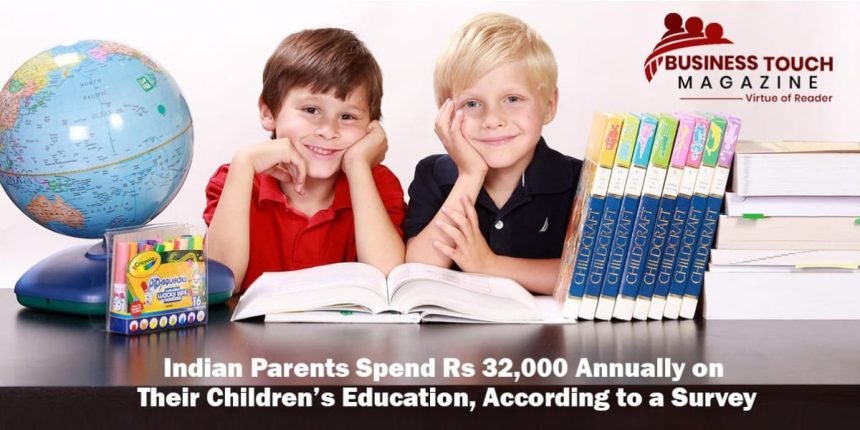The data shows large gaps exist in education spending across the country.
According to the latest in Education, a recent survey conducted to find the spending by parents on their children’s education revealed that the average amount spend on this is Rs 32,000. The data shows large gaps exist in education spending across the country, owing to factors such as expensive options for supplementary education, varying availability of resources, and levels of education of the parents. As we move from Tier I to Tier IV, the average spending on education reduces, which influences the equitable access to education in the country.
Around
- Rs 43,000 is spent by families from Tier I,
- Rs 33,000 from Tier II,
- Rs 34,000 from Tier III,
- Rs 29,000 from Tier IV
Further findings revealed that 7% of families in Tier 1 cities spend under Rs 10,000 on their child’s schooling, as compared to 18% of parents in Tier 4 cities in the country. As per the study, on average, Indian families spend Rs 16,000 annually on after-school education including personal tutors, tuition classes, and coaching classes. Families from Tier 1 spend Rs 19,000, from Tier II Rs 18,000. Those from Tier III spend Rs 14,000 and Rs 14,000 from Tier IV.
Overall, 32% of families in Tier I cities spent less than Rs 10,000 on after-school services, as compared to 41% of parents in Tier IV regions. This study was conducted in collaboration with PGA Labs on the overall spending on a child’s schooling and education in India among those in affordable private and government schools.
India has the largest K-12 schooling system in the world
India has the largest K-12 schooling system in the world, with 1.5 million schools and 250 million students. As seen in our survey of children studying in affordable private and government schools, on family education are willing to spend more and more, as they understand the importance of school as well as post-school education. Also, there still exists a huge gap in the facilities available across the country, which affects the expenditure on education Through this survey, we wanted to understand the spending habits of India’s average household in terms of schooling in India. This allows us to understand the supply and demand gap. It will help in working towards bridging permanently.
Obsession of an Indian parent with their children’s education
It doesn’t take a genius to imagine what kind of control parents exercise on their child’s education, especially because it is considered the most important factor in a child’s life, an aspect that determines what kind of future they will have. The fear of seeing their children living with a failed career and doomed future is enough for parents to funnel their wards into certain educational streams which are deemed by them as the ‘only option for a bright future’.
And children, with no expert advice and counseling, sacrifice their talents and creative dreams and bow down in front of the ‘supreme authority of their parents. However, there is also one fact that makes Indian parents stand out among others. It is a fact that despite their controlling nature, Indian parents are unmatched in terms of support and backing. There is no region in the world, including developed nations, where parents are willing to support their children in education to the extent that Indian parents do.
Surprising Findings
The study revealed some rather amusing and surprising findings. According to the study, when asked whether they prefer their children’s happiness or their career, 51% of Indian parents replied the latter. On the contrary, parents in developed nations like USA and UK when asked the same question said that they prefer their children’s happiness over their career success. Neither do Indian parents want their wards to lead an unhappy life nor do their western counterparts careless when it comes to the careers of their children. The only thing which separates them is the perception of success.
Indian parents are keen on their child’s homework
Indian parents are among the world’s most keen to spend time with their children on schoolwork and are also the most optimistic about education standards in the country, a new worldwide education study has revealed. The ‘Global Parents Survey’, commissioned by UK-based Varkey Foundation compared the attitudes and priorities of over 27,000 parents across 29 countries. Indian parents emerged as the most likely to help their children with their education at 95% and they also reported spending longer helping their children with schoolwork, with 62% spending seven or more hours a week. This contrasts with parents in the UK, who are much less likely to spend more than an hour per day helping with their children’s schoolwork.
Among other key findings, nearly three-quarters (72%) of Indian parents said that education standards have improved in the last 10 years, higher than any other country surveyed and 87% of Indian parents rated the quality of teaching at their child’s school as good, compared with a global average of 78%.
The preference for international university education is valued very high in most Asian economies. While 69% of the Chinese parent would pay at least 25% more for an international university education 59% of the Indian parents too would opt for such a choice. Other nations which give preference would international university education include Hong Kong (625), Taiwan (59%), Indonesia (52%), and Singapore (50%).
All these certainly show that Indian parents have set the bar a bit too high for the children to easily match.




